英语课外阅读笔记铁路少年
- 格式:doc
- 大小:88.00 KB
- 文档页数:11
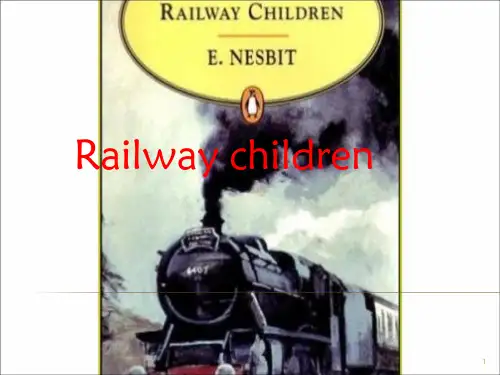
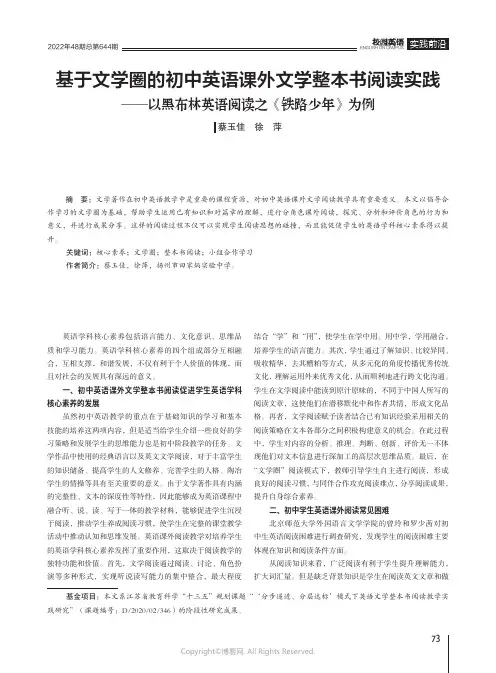
ENGLISH ON CAMPUS2022年48期总第644期基于文学圈的初中英语课外文学整本书阅读实践——以黑布林英语阅读之《铁路少年》为例摘 要:文学著作在初中英语教学中是重要的课程资源,对初中英语课外文学阅读教学具有重要意义。
本文以倡导合作学习的文学圈为基础,帮助学生运用已有知识和对篇章的理解,进行分角色课外阅读,探究、分析和评价角色的行为和意义,并进行成果分享。
这样的阅读过程不仅可以实现学生阅读思想的碰撞,而且能促使学生的英语学科核心素养得以提升。
关键词:核心素养;文学圈;整本书阅读;小组合作学习作者简介:蔡玉佳,徐萍,扬州市田家炳实验中学。
英语学科核心素养包括语言能力、文化意识、思维品质和学习能力。
英语学科核心素养的四个组成部分互相融合,互相支撑,和谐发展,不仅有利于个人价值的体现,而且对社会的发展具有深远的意义。
一、初中英语课外文学整本书阅读促进学生英语学科核心素养的发展虽然初中英语教学的重点在于基础知识的学习和基本技能的培养这两项内容,但是适当给学生介绍一些良好的学习策略和发展学生的思维能力也是初中阶段教学的任务。
文学作品中使用的经典语言以及英文文学阅读,对于丰富学生的知识储备、提高学生的人文修养、完善学生的人格、陶冶学生的情操等具有至关重要的意义。
由于文学著作具有内涵的完整性、文本的深度性等特性,因此能够成为英语课程中融合听、说、读、写于一体的教学材料,能够促进学生沉浸于阅读,推动学生养成阅读习惯,使学生在完整的课堂教学活动中推动认知和思维发展。
英语课外阅读教学对培养学生的英语学科核心素养发挥了重要作用,这取决于阅读教学的独特功能和价值。
首先,文学阅读通过阅读、讨论、角色扮演等多种形式,实现听说读写能力的集中整合,最大程度结合“学”和“用”,使学生在学中用。
用中学,学用融合,培养学生的语言能力。
其次,学生通过了解知识、比较异同、吸收精华,去其糟粕等方式,从多元化的角度传播优秀传统文化,理解运用外来优秀文化,从而顺利地进行跨文化沟通。
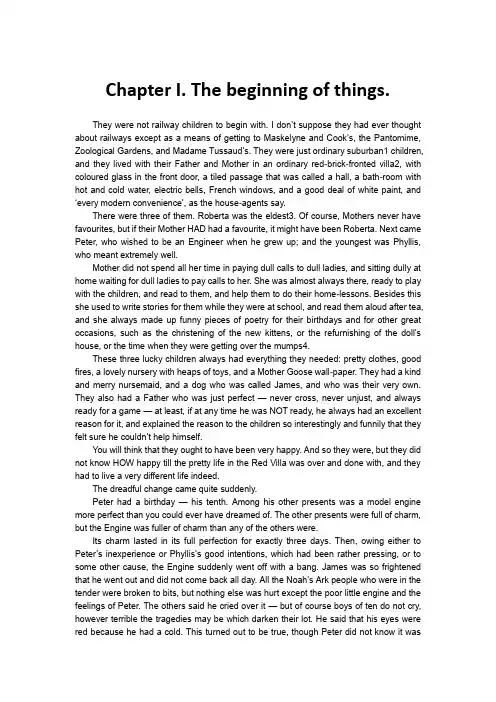
Chapter I. The beginning of things.They were not railway children to begin with. I don’t suppose they had ever thought about railways except as a means of getting to Maskelyne and Cook’s, the Pantomime, Zoological Gardens, and Madame Tussaud’s. They were just ordinary suburban1 children, and they lived with their Father and Mother in an ordinary red-brick-fronted villa2, with coloured glass in the front door, a tiled passage that was called a hall, a bath-room with hot and cold water, electric bells, French windows, and a good deal of white paint, and ‘every modern convenience’, as the house-agents say.There were three of them. Roberta was the eldest3. Of course, Mothers never have favourites, but if their Mother HAD had a favourite, it might have been Roberta. Next came Peter, who wished to be an Engineer when he grew up; and the youngest was Phyllis, who meant extremely well.Mother did not spend all her time in paying dull calls to dull ladies, and sitting dully at home waiting for dull ladies to pay calls to her. She was almost always there, ready to play with the children, and read to them, and help them to do their home-lessons. Besides this she used to write stories for them while they were at school, and read them aloud after tea, and she always made up funny pieces of poetry for their birthdays and for other great occasions, such as the christening of the new kittens, or the refurnishing of the doll’s house, or the time when they were getting over the mumps4.These three lucky children always had everything they needed: pretty clothes, good fires, a lovely nursery with heaps of toys, and a Mother Goose wall-paper. They had a kind and merry nursemaid, and a dog who was called James, and who was their very own. They also had a Father who was just perfect — never cross, never unjust, and always ready for a game — at least, if at any time he was NOT ready, he always had an excellent reason for it, and explained the reason to the children so interestingly and funnily that they felt sure he couldn’t help himself.You will think that they ought to have been very happy. And so they were, but they did not know HOW happy till the pretty life in the Red Villa was over and done with, and they had to live a very different life indeed.The dreadful change came quite suddenly.Peter had a birthday — his tenth. Among his other presents was a model engine more perfect than you could ever have dreamed of. The other presents were full of charm, but the Engine was fuller of charm than any of the others were.Its charm lasted in its full perfection for exactly three days. Then, owing either to Peter’s inexperience or Phyllis’s good intentions, which had been rather pressing, or to some other cause, the Engine suddenly went off with a bang. James was so frightened that he went out and did not come back all day. All the Noah’s Ark people who were in the tender were broken to bits, but nothing else was hurt except the poor little engine and the feelings of Peter. The others said he cried over it — but of course boys of ten do not cry, however terrible the tragedies may be which darken their lot. He said that his eyes were red because he had a cold. This turned out to be true, though Peter did not know it waswhen he said it, the next day he had to go to bed and stay there. Mother began to be afraid that he might be sickening for measles5, when suddenly he sat up in bed and said:“I hate gruel6 — I hate barley7 water — I hate bread and milk. I want to get up and have something REAL to eat.”“What would you like?” Mother asked.“A pigeon-pie,” said Peter, eagerly, “a large pigeon-pie. A very large one.”So Mother asked the Cook to make a large pigeon-pie. The pie was made. And when the pie was made, it was cooked. And when it was cooked, Peter ate some of it. After that his cold was better. Mother made a piece of poetry to amuse him while the pie was being made. It began by saying what an unfortunate but worthy8 boy Peter was, then it went on: He had an engine that he lovedWith all his heart and soul,And if he had a wish on earthIt was to keep it whole.One day — my friends, prepare your minds;I’m coming to the worst —Quite suddenly a screw went mad,And then the boiler9 burst!With gloomy face he picked it upAnd took it to his Mother,Though even he could not supposeThat she could make another;For those who perished on the lineHe did not seem to care,His engine being more to himThan all the people there.And now you see the reason whyOur Peter has been ill:He soothes10 his soul with pigeon-pieHis gnawing11 grief to kill.He wraps himself in blankets warmAnd sleeps in bed till late,Determined12 thus to overcomeHis miserable13 fate.And if his eyes are rather red,His cold must just excuse it:Offer him pie; you may be sureHe never will refuse it.Father had been away in the country for three or four days. All Peter’s hopes for the curing of his afflicted14 Engine were now fixed15 on his Father, for Father was most wonderfully clever with his fingers. He could mend all sorts of things. He had often acted as veterinary surgeon to the wooden rocking-horse; once he had saved its life when all human aid was despaired of, and the poor creature was given up for lost, and even the carpenter said he didn’t see his way to do anything. And it was Father who mended thedoll’s cradle when no one else could; and with a little glue and some bits of wood and a pen-knife made all the Noah’s Ark beasts as strong on their pins as ever they were, if not stronger.Peter, with heroic unselfishness, did not say anything about his Engine till after Father had had his dinner and his after-dinner cigar. The unselfishness was Mother’s idea — but it was Peter who carried it out. And needed a good deal of patience, too.At last Mother said to Father, “Now, dear, if you’re quite rested, and quite comfy, we want to tell you about the great railway accident, and ask your advice.”“All right,” said Father, “fire away!”So then Peter told the sad tale, and fetched what was left of the Engine.“Hum,” said Father, when he had looked the Engine over very carefully.The children held their breaths.“Is there NO hope?” said Peter, in a low, unsteady voice.“Hope? Rather! Tons of it,” said Father, cheerfully; “but it’ll want something besides hope — a bit of brazing say, or some solder16, and a new valve. I think we’d better keep it for a rainy day. In other words, I’ll give up Saturday afternoon to it, and you shall all help me.”“CAN girls help to mend engines?” Peter asked doubtfully.“Of course they can. Girls are just as clever as boys, and don’t you forget it! How would you like to be an engine-driver, Phil?”“My face would be always dirty, wouldn’t it?” said Phyllis, in unenthusiastic tones, “and I expect I should break something.”“I should just love it,” said Roberta —“do you think I could when I’m grown up, Daddy? Or even a stoker?”“You mean a fireman,” said Daddy, pulling and twisting at the engine. “Well, if you still wish it, when you’re grown up, we’ll see about making you a fire-woman. I remember when I was a boy —”Just then there was a knock at the front door.“Who on earth!” said Father. “An Englishman’s house is his castle, of course, but I do wish they built semi-detached villas17 with moats and drawbridges.”Ruth — she was the parlour-maid and had red hair — came in and said that two gentlemen wanted to see the master.“I’ve shown them into the Library, Sir,” said she.“I expect it’s the subscription18 to the Vicar’s testimonial,” said Mother, “or else it’s the choir19 holiday fund. Get rid of them quickly, dear. It does break up an evening so, and it’s nearly the children’s bedtime.”But Father did not seem to be able to get rid of the gentlemen at all quickly.“I wish we HAD got a moat and drawbridge,” said Roberta; “then, when we didn’t want people, we could just pull up the drawbridge and no one else could get in. I expect Father will have forgotten about when he was a boy if they stay much longer.”Mother tried to make the time pass by telling them a new fairy story about a Princess with green eyes, but it was difficult because they could hear the voices of Father and the gentlemen in the Library, and Father’s voice sounded louder and different to the voice he generally used to people who came about testimonials and holiday funds.Then the Library bell rang, and everyone heaved a breath of relief.“They’re going now,” said Phyllis; “he’s rung to have them shown out.”But instead of showing anybody out, Ruth showed herself in, and she looked queer, the children thought.“Please’m,” she said, “the Master wants you to just step into the study. He looks like the dead, mum; I think he’s had bad news. You’d best prepare yourself for the worst, ‘m — p’raps it’s a death in the family or a bank busted20 or —”“That’ll do, Ruth,” said Mother gently; “you can go.”Then Mother went into the Library. There was more talking. Then the bell rang again, and Ruth fetched a cab. The children heard boots go out and down the steps. The cab drove away, and the front door shut. Then Mother came in. Her dear face was as white as her lace collar, and her eyes looked very big and shining. Her mouth looked like just a line of pale red — her lips were thin and not their proper shape at all.“It’s bedtime,” she said. “Ruth will put you to bed.”“But you promised we should sit up late tonight because Father’s come home,” said Phyllis.“Father’s been called away — on business,” said Mother. “Come, darlings, go at once.”They kissed her and went. Roberta lingered to give Mother an extra hug and to whisper:“It wasn’t bad news, Mammy, was it? Is anyone dead — or —”“Nobody’s dead — no,” said Mother, and she almost seemed to push Roberta away. “I can’t tell you anything tonight, my pet. Go, dear, go NOW.”So Roberta went.Ruth brushed the girls’ hair and helped them to undress. (Mother almost always did this herself.) When she had turned down the gas and left them she found Peter, still dressed, waiting on the stairs.“I say, Ruth, what’s up?” he asked.“Don’t ask me no questions and I won’t tell you no lies,” the red-headed Ruth replied. “You’ll know soon enough.”Late that night Mother came up and kissed all three children as they lay asleep. But Roberta was the only one whom the kiss woke, and she lay mousey-still, and said nothing.“If Mother doesn’t want us to know she’s been crying,” she said to herself as she heard through the dark the catching21 of her Mother’s breath, “we WON’T know it. That’s all.”When they came down to breakfast the next morning, Mother had already gone out.“To London,” Ruth said, and left them to their breakfast.“There’s something awful the matter,” said Peter, breaking his egg. “Ruth told me last night we should know soon enough.”“Did you ASK her?” said Roberta, with scorn.“Yes, I did!” said Peter, angrily. “If you could go to bed without caring whether Mother was worried or not, I couldn’t. So there.”“I don’t think we ought to ask the servants things Mother doesn’t tell us,” said Roberta.“That’s right, Miss Goody-goody,” said Peter, “preach away.”“I’M not goody,” said Phyllis, “but I think Bobbie’s right this time.”“Of course. She always is. In her own opinion,” said Peter.“Oh, DON’T!” cried Roberta, putting down her egg-spoon; “don’t let’s be horrid22 to each other. I’m sure some dire23 calamity24 is happening. Don’t let’s make it worse!”“Who began, I should like to know?” said Peter.Roberta made an effort, and answered:—“I did, I suppose, but —”“Well, then,” said Peter, triumphantly25. But before he went to school he thumped26 his sister between the shoulders and told her to cheer up.The children came home to one o’clock dinner, but Mother was not there. And she was not there at tea-time.It was nearly seven before she came in, looking so ill and tired that the children felt they could not ask her any questions. She sank into an arm-chair. Phyllis took the long pins out of her hat, while Roberta took off her gloves, and Peter unfastened her walking-shoes and fetched her soft velvety27 slippers28 for her.When she had had a cup of tea, and Roberta had put eau-de-Cologne on her poor head that ached, Mother said:—“Now, my darlings, I want to tell you something. Those men last night did bring very bad news, and Father will be away for some time. I am very worried about it, and I want you all to help me, and not to make things harder for me.”“As if we would!” said Roberta, holding Mother’s hand against her face.“You can help me very much,” said Mother, “by being good and happy and not quarrelling when I’m away”— Roberta and Peter exchanged guilty glances —“for I shall have to be away a good deal.”“We won’t quarrel. Indeed we won’t,” said everybody. And meant it, too.“Then,” Mother went on, “I want you not to ask me any questions about this trouble; and not to ask anybody else any questions.”Peter cringed and shuffled29 his boots on the carpet.“You’ll promise this, too, won’t you?” said Mother.“I did ask Ruth,” said Peter, suddenly. “I’m very sorry, but I did.”“And what did she say?”“She said I should know soon enough.”“It isn’t necessary for you to know anything about it,” said Mother; “it’s about business, and you never do understand business, do you?”“No,” said Roberta; “is it something to do with Government?” For Father was in a Government Office.“Yes,” said Mother. “Now it’s bed-time, my darlings. And don’t YOU worry. It’ll all come right in the end.”“Then don’t YOU worry either, Mother,” said Phyllis, “and we’ll all be as good as gold.”Mother sighed and kissed them.“We’ll begin being good the first thing tomorrow morning,” said Peter, as they went upstairs.“Why not NOW?” said Roberta.“There’s nothing to be good ABOUT now, silly,” said Peter.“We might begin to try to FEEL good,” said Phyllis, “and not call names.”“Who’s calling names?” said Peter. “Bobbie knows right enough that when I say ‘silly’, it’s just the same as if I said Bobbie.”“WELL,” said Roberta.“No, I don’t mean what you mean. I mean it’s just a — what is it Father calls it? — a germ of endearment30! Good night.”The girls folded up their clothes with more than usual neatness — which was the only way of being good that they could think of.“I say,” said Phyllis, smoothing out her pinafore, “you used to say it was so dull — nothing happening, like in books. Now something HAS happened.”“I never wanted things to happen to make Mother unhappy,” said Roberta. “Everything’s perfectly31 horrid.”Everything continued to be perfectly horrid for some weeks.Mother was nearly always out. Meals were dull and dirty. The between-maid was sent away, and Aunt Emma came on a visit. Aunt Emma was much older than Mother. She was going abroad to be a governess. She was very busy getting her clothes ready, and they were very ugly, dingy32 clothes, and she had them always littering about, and the sewing-machine seemed to whir — on and on all day and most of the night. Aunt Emma believed in keeping children in their proper places. And they more than returned the compliment. Their idea of Aunt Emma’s proper place was anywhere where they were not. So they saw very little of her. They preferred the company of the servants, who were more amusing. Cook, if in a good temper, could sing comic songs, and the housemaid, if she happened not to be offended with you, could imitate a hen that has laid an egg, a bottle of champagne33 being opened, and could mew like two cats fighting. The servants never told the children what the bad news was that the gentlemen had brought to Father. But they kept hinting that they could tell a great deal if they chose — and this was not comfortable.One day when Peter had made a booby trap over the bath-room door, and it had acted beautifully as Ruth passed through, that red-haired parlour-maid caught him and boxed his ears.“You’ll come to a bad end,” she said furiously, “you nasty little limb, you! If you don’t mend your ways, you’ll go where your precious Father’s gone, so I tell you straight!”Roberta repeated this to her Mother, and next day Ruth was sent away.Then came the time when Mother came home and went to bed and stayed there two days and the Doctor came, and the children crept wretchedly about the house and wondered if the world was coming to an end.Mother came down one morning to breakfast, very pale and with lines on her face that used not to be there. And she smiled, as well as she could, and said:—“Now, my pets, everything is settled. We’re going to leave this house, and go and live in the country. Such a ducky dear little white house. I know you’ll love it.”A whirling week of packing followed — not just packing clothes, like when you go to the seaside, but packing chairs and tables, covering their tops with sacking and their legs with straw.All sorts of things were packed that you don’t pack when you go to the seaside. Crockery, blankets, candlesticks, carpets, bedsteads, saucepans, and even fenders and fire-irons.The house was like a furniture warehouse34. I think the children enjoyed it very much. Mother was very busy, but not too busy now to talk to them, and read to them, and even to make a bit of poetry for Phyllis to cheer her up when she fell down with a screwdriver35 and ran it into her hand.“Aren’t you going to pack this, Mother?” Roberta asked, pointing to the beautiful cabinet inlaid with red turtleshell and brass36.“We can’t take everything,” said Mother.“But we seem to be taking all the ugly things,” said Roberta.“We’re taking the useful ones,” said Mother; “we’ve got to play at being Poor for a bit, my chickabiddy.”When all the ugly useful things had been packed up and taken away in a van by men in green-baize aprons37, the two girls and Mother and Aunt Emma slept in the two spare rooms where the furniture was all pretty. All their beds had gone. A bed was made up for Peter on the drawing-room sofa.“I say, this is larks,” he said, wriggling38 joyously39, as Mother tucked him up. “I do like moving! I wish we moved once a month.”Mother laughed.“I don’t!” she said. “Good night, Peterkin.”As she turned away Roberta saw her face. She never forgot it.“Oh, Mother,” she whispered all to herself as she got into bed, “how brave you are! How I love you! Fancy being brave enough to laugh when you’re feeling like THAT!”Next day boxes were filled, and boxes and more boxes; and then late in the afternoon a cab came to take them to the station.Aunt Emma saw them off. They felt that THEY were seeing HER off, and they were glad of it.“But, oh, those poor little foreign children that she’s going to governess!” whispered Phyllis. “I wouldn’t be them for anything!”At first they enjoyed looking out of the window, but when it grew dusk they grew sleepier and sleepier, and no one knew how long they had been in the train when they were roused by Mother’s shaking them gently and saying:—“Wake up, dears. We’re there.”They woke up, cold and melancholy40, and stood shivering on the draughty platform while the baggage was taken out of the train. Then the engine, puffing42 and blowing, set to work again, and dragged the train away. The children watched the tail-lights of the guard’s van disappear into the darkness.This was the first train the children saw on that railway which was in time to become so very dear to them. They did not guess then how they would grow to love the railway, and how soon it would become the centre of their new life, nor what wonders and changes it would bring to them. They only shivered and sneezed and hoped the walk to the new house would not be long. Peter’s nose was colder than he ever remembered it to have been before. Roberta’s hat was crooked43, and the elastic44 seemed tighter than usual.Phyllis’s shoe-laces had come undone45.“Come,” said Mother, “we’ve got to walk. There aren’t any cabs here.”The walk was dark and muddy. The children stumbled a little on the rough road, and once Phyllis absently fell into a puddle46, and was picked up damp and unhappy. There were no gas-lamps on the road, and the road was uphill. The cart went at a foot’s pace, and they followed the gritty crunch47 of its wheels. As their eyes got used to the darkness, they could see the mound48 of boxes swaying dimly in front of them.A long gate had to be opened for the cart to pass through, and after that the road seemed to go across fields — and now it went down hill. Presently a great dark lumpish thing showed over to the right.“There’s the house,” said Mother. “I wonder why she’s shut the shutters49.”“Who’s SHE?” asked Roberta.“The woman I engaged to clean the place, and put the furniture straight and get supper.”There was a low wall, and trees inside.“That’s the garden,” said Mother.“It looks more like a dripping-pan full of black cabbages,” said Peter.The cart went on along by the garden wall, and round to the back of the house, and here it clattered50 into a cobble-stoned yard and stopped at the back door.There was no light in any of the windows.Everyone hammered at the door, but no one came.The man who drove the cart said he expected Mrs. Viney had gone home.“You see your train was that late,” said he.“But she’s got the key,” said Mother. “What are we to do?”“Oh, she’ll have left that under the doorstep,” said the cart man; “folks do hereabouts.” He took the lantern off his cart and stooped.“Ay, here it is, right enough,” he said.He unlocked the door and went in and set his lantern on the table.“Got e’er a candle?” said he.“I don’t know where anything is.” Mother spoke51 rather less cheerfully than usual.He struck a match. There was a candle on the table, and he lighted it. By its thin little glimmer52 the children saw a large bare kitchen with a stone floor. There were no curtains, no hearth-rug. The kitchen table from home stood in the middle of the room. The chairs were in one corner, and the pots, pans, brooms, and crockery in another. There was no fire, and the black grate showed cold, dead ashes.As the cart man turned to go out after he had brought in the boxes, there was a rustling53, scampering54 sound that seemed to come from inside the walls of the house.“Oh, what’s that?” cried the girls.“It’s only the rats,” said the cart man. And he went away and shut the door, and the sudden draught41 of it blew out the candle.“Oh, dear,” said Phyllis, “I wish we hadn’t come!” and she knocked a chair over.“ONLY the rats!” said Peter, in the dark.。
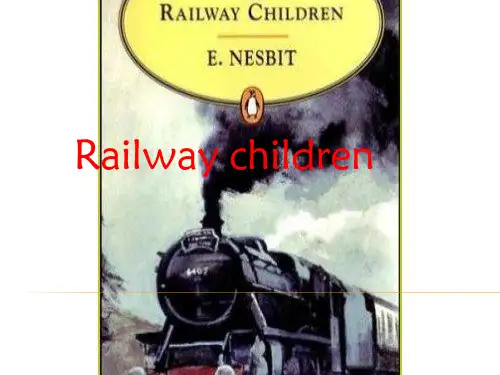
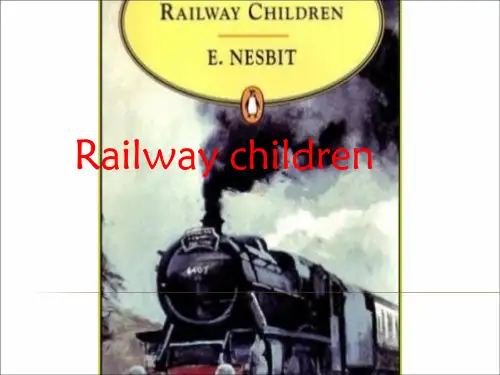
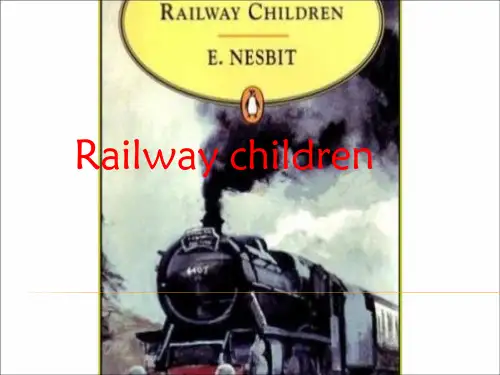
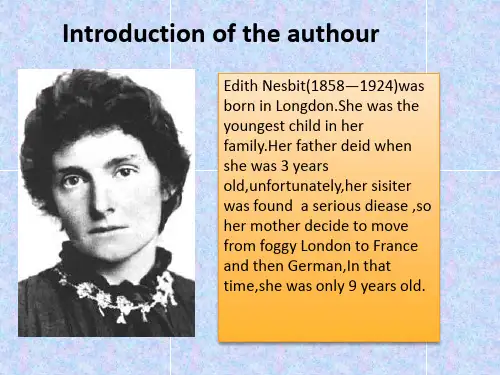
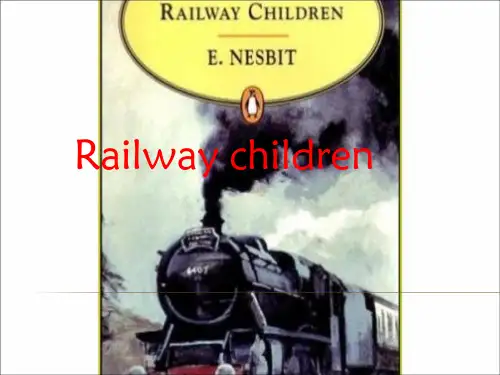
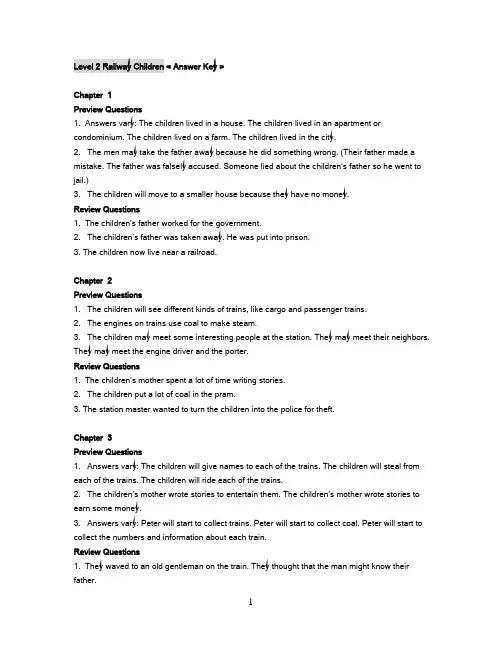
Level 2 Railway Children < Answer Key >Chapter 1Preview Questions1. Answers vary: The children lived in a house. The children lived in an apartment or condominium. The children lived on a farm. The children lived in the city.2. The men may take the father away because he did something wrong. (Their father made a mistake. The father was falsely accused. Someone lied about the children’s father so he went to jail.)3. The children will move to a smaller house because they have no money.Review Questions1. The children’s father worked for the government.2. The children’s father was taken away. He was put into prison.3. The children now live near a railroad.Chapter 2Preview Questions1. The children will see different kinds of trains, like cargo and passenger trains.2. The engines on trains use coal to make steam.3. The children may meet some interesting people at the station. They may meet their neighbors. They may meet the engine driver and the porter.Review Questions1. The children’s mother spent a lot of time writing stories.2. The children put a lot of coal in the pram.3. The station master wanted to turn the children into the police for theft.Chapter 3Preview Questions1. Answers vary: The children will give names to each of the trains. The children will steal from each of the trains. The children will ride each of the trains.2. The children’s mother wrote stories to entertain them. The children’s mother wrote stories to earn some money.3. Answers vary: Peter will start to collect trains. Peter will start to collect coal. Peter will start to collect the numbers and information about each train.Review Questions1. They waved to an old gentleman on the train. They thought that the man might know their father.2. The children wrote to the man on the train because they thought he would help them. They thought he might know their father. They wrote to him because they had no money and no one else could help them.3. The old gentleman sent everything the children asked for in their letter. He included a note, as well.Chapter 4Preview Questions1. The children’s mother will be angry with them because they begged help from a stranger. (Their mother will be angry with them because they did not obey her.)2. The children’s mother will write to thank the old gentleman on the train. She will also apologize for her children’s behavior.3. The doctor will call Roberta ‘Head Nurse’ because she is in charge of taking care of her mother.Review Questions1. The children’s mother was worried about paying for the doctor’s bill.2. Peter gave Roberta a model of the railway and his favorite engine.3. Roberta took the broken engine to the engine driver, who easily fixed it. She then gave the repaired toy back to Peter.Chapter 5Preview Questions1. Answers vary: The children may go to see the train from London. They may go to see a train that they think their mother is on. They may go see a train if they think their father is on it.2. Answers vary: The passengers on the train will be looking at the scenery. The passengers on the train will be looking at the railway station and the workers. The passengers on the train will be looking at the children.3. Answers vary: The children will not be able to speak to the strange man because they are scared of him. They will not be able to speak to the strange man because their mother told them not to talk to strangers. They will not be able to speak to the strange man because they are busy. Review Questions1. The children’s mother spoke to the man. She took him into her home. She got the doctor for him. She also gave the Russian man some clothes.2. The children’s mother spoke to the Russian man in French.3. The man was poor and ill because he was a refugee. He escaped from Russia. He had spoken against the government there and had been in prison. He was looking for his wife and children.Chapter 6Preview Questions1. The children’s mother will take care of the man until he is better. She will pray for him. (She will help him find his family.)2. The trees above the tunnel will collapse in a landslide. (The trees will fall onto the track and block the tunnel. The trees will fall on a train or on some people.)3. The children can tell the station master about the trees. (The children can warn the trains witha sign.)Review Questions1. The children waved part of a dress as a signal.2. The engine driver stopped the train when he saw the red flags the children were waving.3. The passengers cheered because the children had prevented a serious accident. (The children stopped the train from hitting the trees.)Chapter 7Preview Questions1. Answers vary: The children’s mother wrote a letter about the children. The engine driver wrotea letter about the children. One of the passengers wrote a letter about the children.2. The letter will be about how the children saved the train. (The letter will be about how the children prevented a serious accident and saved many lives.)3. The children will be thankful for the letter. They will think that it was the right thing to do and be very humble.Review Questions1. The children wrote to the old gentleman because they thought he might be able to help the Russian man. (They thought the old gentleman could help find the Russian’s family.)2. The children asked if the old gentleman would get off the train and speak with them about the prisoner. (They wanted to ask the old gentleman if he could help the Russian.)3. The old gentleman found the Russian man’s family.Chapter 8Preview Questions1. Peter will cause trouble at the canal. (Peter will have a problem at the canal.)2. The people who live on the barges will be unhappy with Peter. (A bargee will be angry with Peter.)3. Answers vary: The bargee may be angry with Peter and visit his house to speak with his mother. The bargee may run away. The bargee may go to the railway station and get on a train. Review Questions1. Roberta found a newspaper clipping. It was about her father.2. Roberta found out that her father had been arrested for spying. (Roberta found out that her father had been framed. Another man had wanted her father’s job. The other man pretended that her father was a spy. Roberta’s father was sent to prison even though he was innocent. )3. Roberta wrote to the old gentleman because she thought he may be able to help her father.Chapter 9Preview Questions1. Answers vary: The children may take the boy home. The children may give the boy some food and a place to stay.2. The children’s mother will help the boy by taking him into her home. The children’s mother will help the boy by helping him find his parents.3. The children’s mother will write to the old gentleman.Review Questions1. Jim’s grandfather came to take Jim home. Jim’s grandfather was the old gentleman who had helped out the children’s family.2. The old gentleman allowed Jim to stay with the children while his leg healed.3. The old gentleman asked the court to review the father’s case. He asked them to look at the evidence again and set the father free.Level 2 Railway Children < Summaries >Chapter 1When the children’s father has to go away, the children and their mother move away from their fine house in the town. They move to a smaller house in the country. It is not very clean and it is near the railway. The children enjoy their new life even though it is quite hard.Chapter 2The children walk along the railway line to the station where they see piles of coal. Later, when it is cold, Peter wants to light a fire but his mother has no money to buy coal. The three children go to the station and take some coal. The station master sees them take it and is angry with them.Chapter 3The children’s mother writes stories to earn money but is not always able to sell them. The children spend their time watching the trains go by. On one of the trains there is an old gentleman who waves to them. When the children’s mother is ill and they don’t have any money to buy her special food, they send a letter to the old gentlemen about their problem. He sends them a parcel full of good things for their mother.Chapter 4The children’s mother is angry with them for writing to the old gentleman. There is a problem with the size of the doctor’s bill. Roberta has a birthday. Her brother gives her a broken toy engine. One of the engine drivers mends it for her.Chapter 5The children go to the station to meet their mother when she returns from a visit to London. While they are waiting a train comes in with a sick man on it who cannot speak English. When the children’s mother’s train arrives, they tell her about the man. She speaks to him in French and finds out that he is a refugee. She takes him back to their home.Chapter 6The children go to the railway tunnel to pick wild strawberries. They see a landslide that will cause a bad railway accident. They have to warn the driver of the next train. They are able to make red flags and stop the train. The driver and the passengers are grateful to the childrenChapter 7The children are given a reward by the railway company for preventing the accident. They tell the old gentleman about the man, who is Russian. They ask him if he can help the refugee. The old man knows that the Russian is a famous writer. He asks questions in London and finds the man’s wife.Chapter 8The children rescue a baby from a barge that catches fire. Roberta finds an old newspaper in which there is a story about the children’s father. He is in prison for being a spy. The children’smother tells them it is a mistake. Roberta asks the old gentleman to help them get their father out of prisonChapter 9The children find a boy with a broken leg in the tunnel. They take him home and send for the doctor. Their mother lets the boy stay with them. He is visited by the old gentleman who is his grandfather. He is grateful to the children. He talks to important people and the children’s father is let out of prison. His arrest was a mistake.Before You ReadI. L ook at the trains. Write five words or phrases foreach one.Old trainc arries things, long ago, lots of smoke, slow, woodand metalModern trainc arries people, fast, metal and plastic, no smoke,these daysI I. S can through the book and write the name of eachcharacter.a. Peterb. Motherc. Jim’s grandfatherd. Roberta and Phyllise. The station masterI I I.M atch the words with similar meanings.1.f2. d3. e4. b5. c6. a7. i8. j9.h 10. g[ Chapter 1 ] H ow It All BeganI.A re these sentences correct? Write “T” for true and“F” for false.1.F2.T3.T4.T5. TI I.C hoose the best answer.1.c2.d3.b4. dI I I.W rite the correct word in each blank.1.cellar2. pumpernment4.looked after5.blew up6. ordinary7.maid 8. cottage9. mend 10. modelI V.W rite the sentences in the correct order.1.T heir father had to go away with some men.2.T he family had to move to a smaller house inthe country.3.T he children thought about their new life in thecountry.4.T hey all enjoyed the food that Mrs. Viney hadmade.[ Chapter 2 ] Coal Mines!I.P ut the sentences in order from 1 (first) to 5 (last).4, 5, 2, 3, 1I I.Choose the best answer.1.b2.b3.c4. bI I I.M atch the word with the meaning used in thechapter.1.i2. j3. b4. g5. h6. a7. c8. e9.f 10. dI V.C omplete the summary by writing the correct wordin each blank.1. afford2. pushed3.filled4. caught5. police[ Chapter 3 ] T he Green DragonI.A re these sentences correct? Write “T” for true and“F” for false.1.F2.T3.F4.F5. FI I.Choose the best answer.1.d2.d3.d4. cI I I.C ircle the correct word.1. rushed2. wondered3. buns4. signal5. an editor6. list7. notice 8. worse9.knock 10. parcelI V.W rite the sentences in the correct order.1.M rs. Viney sent for the doctor in the village.2.P eter held up a notice as the train came out ofthe tunnel.3.T he old gentleman read the letter and put it inhis pocket.4.The parcel was full of everything from the list.1[ Chapter 4 ] A Birthday SongI.P ut the sentences in order from 1 (first) to 5 (last).4, 2, 5, 1, 3I I.Choose the best answer.1.c2. b3. d4. bI I I.M atch the word with the meaning used in thechapter.1.i2. h3. g4. e5. j6. a7. b8. c9. d 10. fI V.C omplete the summary by writing the correct wordin each blank.1.stranger2. stay3. canal4. broken5. driver[ Chapter 5 ] A Man Who Needs HelpI.A re these sentences correct? Write “T” for true and“F” for false.1.F2.T3.F4.T5. TI I.Choose the best answer.1.c2. d3. b4. bI I I.W rite the correct word in each blank.1.stamps2. accent3. decided4. fetch5. refugee6. examined7. escaped 8. crowd9. criminal 10. foreignerI V.W rite the sentences in the correct order.1.T he children saw a wild, dirty man lying on theground.2.P eter took out some stamps and showed themto the man.3.P eter and Roberta helped the man walk to theircottage.4.T he man told Mother that he was looking for hiswife and children.[ Chapter 6 ] A Landslide!I.P ut the sentences in order from 1 (first) to 5 (last).4, 2, 1, 3, 5I I.Choose the best answer.1.b2. d3.c4. aI I I.C ircle the correct word.1.prevented2. pleased3. cheered4. fainted5. strips6. watch7. secret 8. thin9. comfortable 10. leaningI V.C omplete the summary by writing the correct wordin each blank.1.cherries2. landslide3. tore4. cheered5. accident[ Chapter 7 ] T he LetterI.A re these sentences correct? Write “T” for true and“F” for false.1.T2.F3.F4.F5. FI I.Choose the best answer.1.b2. d3. c4. bI I I.M atch the word with the meaning used in thechapter.1.f2. g3. h4. i5. j6. a7. e8. b9. c 10. dI V.W rite the sentences in the correct order.1.T he children saw a red carpet on the platformand flowers everywhere.2.E veryone clapped after the wonderfulpresentation.3.T he children had a delightful tea party with theold gentleman.4.T he old gentleman went to the cottage to tell thegood news.2[ Chapter 8 ] What Happened to FatherI.P ut the sentences in order from 1 (first) to 5 (last).4, 1, 3, 5, 2I I.Choose the best answer.1.c2. d3.b4. cI I I.C ircle the correct word.1.whispered2. spy3. public4. ash5. handkerchief6. tow-path7. envelope 8. position9. line 10. innI V.C omplete the summary by writing the correct wordin each blank.1.angry2. smoke3. saved4. news5. prison[ Chapter 9 ] T he Return HomeI.A re these sentences correct? Write “T” for true and“F” for false.1.F2.T3.F4.T5. T I I.Choose the best answer.1.c2. b3. d4. bI I I.W rite the correct word in each blank.1.signalman2. evidence3. address4. due5. demanded6. tripped7. ought 8. journey9. voice 10. innocentI V.W rite the sentences in the correct order.1.T he children found a boy named Jim in the tunnel.2.The doctor came and looked at Jim’s leg.3.T hey were surprised to find that the old gentlemanwas Jim’s grandfather.4.J im stayed with the children and became theirbest friend.After You ReadI.M atch each picture with the correct phrase fromthe story.1.b2.c3.d4.e5. a3。
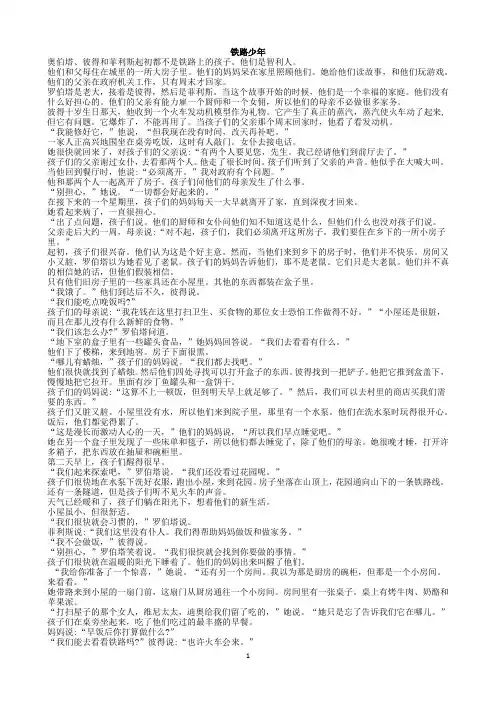
铁路少年奥伯塔、彼得和菲利斯起初都不是铁路上的孩子。
他们是智利人。
他们和父母住在城里的一所大房子里。
他们的妈妈呆在家里照顾他们。
她给他们读故事,和他们玩游戏。
他们的父亲在政府机关工作,只有周末才回家。
罗伯塔是老大,接着是彼得,然后是菲利斯。
当这个故事开始的时候,他们是一个幸福的家庭。
他们没有什么好担心的。
他们的父亲有能力雇一个厨师和一个女佣,所以他们的母亲不必做很多家务。
彼得十岁生日那天,他收到一个火车发动机模型作为礼物。
它产生了真正的蒸汽,蒸汽使火车动了起来,但它有问题。
它爆炸了,不能再用了。
当孩子们的父亲那个周末回家时,他看了看发动机。
“我能修好它,”他说,“但我现在没有时间,改天再补吧。
”一家人正高兴地围坐在桌旁吃饭,这时有人敲门。
女仆去接电话。
她很快就回来了,对孩子们的父亲说:“有两个人要见您,先生。
我已经请他们到前厅去了。
”孩子们的父亲谢过女仆,去看那两个人。
他走了很长时间。
孩子们听到了父亲的声音。
他似乎在大喊大叫。
当他回到餐厅时,他说:“必须离开。
”我对政府有个问题。
”他和那两个人一起离开了房子。
孩子们问他们的母亲发生了什么事。
“别担心,”她说。
“一切都会好起来的。
”在接下来的一个星期里,孩子们的妈妈每天一大早就离开了家,直到深夜才回来。
她看起来病了,一直很担心。
“出了点问题,孩子们说。
他们的厨师和女仆问他们知不知道这是什么,但他们什么也没对孩子们说。
父亲走后大约一周,母亲说:“对不起,孩子们,我们必须离开这所房子。
我们要住在乡下的一所小房子里。
”起初,孩子们很兴奋。
他们认为这是个好主意。
然而,当他们来到乡下的房子时,他们并不快乐。
房间又小又脏,罗伯塔以为她看见了老鼠。
孩子们的妈妈告诉他们,那不是老鼠。
它们只是大老鼠。
他们并不真的相信她的话,但他们假装相信。
只有他们旧房子里的一些家具还在小屋里。
其他的东西都装在盒子里。
“我饿了。
”他们到达后不久,彼得说。
“我们能吃点晚饭吗?”孩子们的母亲说:“我花钱在这里打扫卫生、买食物的那位女士恐怕工作做得不好。
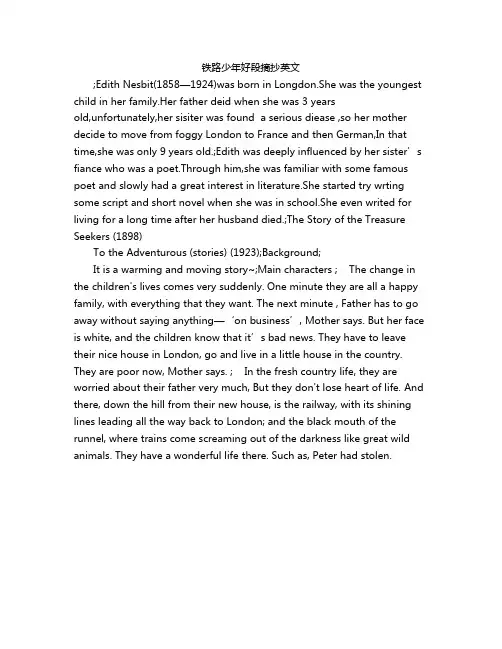
铁路少年好段摘抄英文;Edith Nesbit(1858—1924)was born in Longdon.She was the youngest child in her family.Her father deid when she was 3 yearsold,unfortunately,her sisiter was found a serious diease ,so her mother decide to move from foggy London to France and then German,In that time,she was only 9 years old.;Edith was deeply influenced by her sister’s fiance who was a poet.Through him,she was familiar with some famous poet and slowly had a great interest in literature.She started try wrting some script and short novel when she was in school.She even writed for living for a long time after her husband died.;The Story of the Treasure Seekers (1898)To the Adventurous (stories) (1923);Background;It is a warming and moving story~;Main characters ; The change in the children's lives comes very suddenly. One minute they are all a happy family, with everything that they want. The next minute , Father has to go away without saying anything—‘on business’, Mother says. But her face is white, and the children know tha t it’s bad news. They have to leave their nice house in London, go and live in a little house in the country. They are poor now, Mother says. ; In the fresh country life, they are worried about their father very much, But they don't lose heart of life. And there, down the hill from their new house, is the railway, with its shining lines leading all the way back to London; and the black mouth of the runnel, where trains come screaming out of the darkness like great wild animals. They have a wonderful life there. Such as, Peter had stolen.。
铁路少年手抄报英文版内容Title: The Railway Boy.Introduction:The Railway Boy is an inspiring story of determination, friendship, and adventure. It follows the journey of a young boy named Tom, who finds his passion and purpose in the world of railways.Paragraph 1:Tom, a curious and enthusiastic boy, has always been fascinated by trains. From a young age, he would spend hours watching trains pass by and dreaming of becoming a railway engineer. His love for railways grew stronger with each passing day.Paragraph 2:One day, Tom's dream comes true when he gets the opportunity to join a railway apprenticeship program. Excited and determined, he embarks on a journey to learn everything about the railway industry. From understanding the mechanics of the locomotives to mastering the art of track maintenance, Tom immerses himself in the world of railways.Paragraph 3:Throughout his apprenticeship, Tom faces various challenges and obstacles. He encounters complex technical problems, experiences setbacks, and even deals with difficult colleagues. However, his unwavering passion and perseverance help him overcome these challenges and emerge stronger.Paragraph 4:Along the way, Tom forms deep friendships with fellow apprentices and experienced railway professionals. They support and encourage each other, sharing knowledge andexperiences. Together, they work as a team to accomplish tasks and contribute to the smooth functioning of the railway system.Paragraph 5:As time passes, Tom's skills and expertise in the railway industry continue to grow. He becomes a respected and valued member of the railway community. His dedication and hard work pay off, and he achieves his dream of becoming a successful railway engineer.Conclusion:The Railway Boy is a tale of following one's passion, overcoming obstacles, and the power of friendship. It teaches us the importance of pursuing our dreams and never giving up. Through Tom's journey, we are reminded that with determination and support, we can achieve great things in life.。
铁路少年中英文对照铁路少年的中英文对照如下:中文:铁路少年英文:Railway Boys中文:铁路少年是指对铁路事业有兴趣,热爱火车和铁路的年轻人。
英文:Railway Boys refer to young people who are interested in railway industry and have a passion for trains and railways.中文:这些少年通常参加铁路俱乐部或组织,学习铁路知识和技能。
英文:These boys usually join railway clubs or organizations to learn railway knowledge and skills.中文:他们深入研究火车的构造和运行原理,并且经常参观铁路工厂和车辆。
英文:They delve into the structure and operation principles of trains, and often visit railway factories and vehicles.中文:铁路少年承担义务工作,如维护铁轨和车辆的清洁。
英文:Railway Boys take up voluntary work, such as maintaining track and cleaning vehicles.中文:通过参与铁路活动,他们培养了领导能力和团队合作精神。
英文:Through participating in railway activities, they developleadership skills and teamwork spirit.中文:许多铁路少年将来成为了铁路工程师或火车司机。
英文:Many Railway Boys grow up to become railway engineers or train drivers.。
《铁路少年》英语名著介绍一、作者简介伊迪丝·内斯比特(1858-1924)是英国女作家。
伊迪丝出版过包括各种文体在内的一百来部书,她一直看好她为成人写的作品,尤其是诗歌,但最终她是在儿童文学创作方面大获成功、名声远播,欧亚诸国纷纷译介她的代表作。
伊迪丝的第一部儿童文学作品出版于1890年,是本儿童诗集,叫《两季的歌》。
她的儿童文学创作大体分两类:一类是小说,写现实生活的家庭冒险故事,代表作是描述关于巴斯塔布儿一家的《探宝的孩子们》(1899)和《铁路边的孩子》(1906),这类作品中儿童性格刻画鲜明,家庭生活描写真切动人;另一类是童话,神奇故事,这类作品更为著名,代表作有《五个孩子和一个怪物》(1902)、《沙妖》(1903)、《不死鸟(凤凰)和飞毯》(1904)以及《四个孩子和一个护身符》(1906)等。
这些故事悬念重重、曲折离奇、想象丰富、却理趣结合,给孩子以如临其境、真实可信的感觉。
Edith Nesbitt (1858-1924) was an English woman writer. Edith published more than a hundred books in all genres. She had always admired her work for adults, especially poetry, but it was her success in children's literature that brought her fame and translations into Europe and Asia.Edith's first work of children's literature was published in 1890. It was a collection of children's poetry called Songs of Two Seasons. Her children's literature can be divided into two categories: one is fiction, which is about family adventures in real life. The representative works are The Treasure-hunters(1899) and The Children by the Railway(1906) about the Bustabers. In these works, children's characters are clearly depicted and family life is vividly depicted.The other kind is fairy tale, the magic story, this kind of work is more famous, such as Five Children and a Monster(1902), Sand Demon(1903), Not Die Bird (Phoenix) and Flying Carpet (1904) and Four Children and a Talisman(1906).These stories are full of suspense, twists and turns and bizarre, rich in imagination, but the combination of rational interest, to give children a sense of immersive, authentic and credible.二、人物简介罗倍塔(Roberta)皮特(Peter),菲雷丝(Phyllis)。
The Railway Children 阅读练习题完型填空When the day of the presentation arrived, the children went to the station in their best clothes at the right time. To their surprise, the station looked very(1) ___________ . There was a red (2) _________ on the platform and flowers (3) ____________ . There were chairs for people to (4) ___________ .There were also a lot of people. They were not only their friends who (5) __________ the railway; they were (6)___________ from the train. Their old gentleman friend was there, and they shook hands with him.First, the secretary of the railway company (7)______________ . Then the old gentleman (8)_________ each of the children a beautiful watch.Finally, Peter(9)___________ everyone and said that he and his sisters didnot(10)___________ such a nice reward. Everyone(11)_________ after the wonderful presentation.Later on , the children(12)__________ that it was Perk’s birthday. They planned a (13) ___________ with Mrs Perks. (14)__________, Perks was not happy about receiving (15)__________ food, but later he understood that everyone liked him very much. ( )1. A . strange B. different C. new D. horrible( )2. A. carpet B. blanket C. sheet D. map( )3. A. somewhere B. nowhere C. everywhere D. anywhere( )4. A. sit B. sit on C. stand D. stand on( )5. A. work B. work for C. live D. live on( )6. A. passengers B.workers C. porters D. signalmen( )7. A. made a speech B.speak C. gave a talk D.talked( )8. A. gave to B. gave C. bought D. made( )9. A. talked to B. spoke to C. said to D. thanked( )10.A. deserve B.take C. have D. receive( )11. A. laughed B. smiled C. clapped D.stood up( )12. A. found B. found out C. knew about D. heard about( )13.A. dinner B. gift C. welcome party D. birthday party( )14. A. At first B. First of all C.In the end D. At the end( )15. A. free B. big C. nice D. delicious阅读理解AOne evening, Robert said, “ Can we light a fire, Mother?”“No, dear,” Mother replied. “ It’s summer, and coal is expensive. We can’t afford to have fires in summer even though the evenings are cold.”At tea time that same day, Phyllis wanted to put butter and jam on her bread, but Mother wouldn’t let her.“You can have jam or butter,” she said. “ You can’t have both. We can’t afford it.”One day , children went to play in the railway station and found there were piles of coal between the rails. The piles had white lines on them.A porter came out of his room, and Peter asked him politely, “What are the white lines for on the piles of coal?”“They are so we know how much coal should be there,” the porter said. “So don’t you steal any.”The children thought the porter was joking because he seemed to a friendly man. Two days later in the evening when it was dark, the children went to the station. They filled the pram with coal and pushed it home.They emptied the coal into the place where Mother kept her coal. They did this twice and were doing it the third time when the station master jumped out from behind a truck. He wanted to send them to the police. However, the kind master let them go home after he knew the reason.( )1. They couldn’t light a fire in summer because___________A.it was hot in summer, they didn’t need to light a fire.B.they were too poor to buy the expensive coal.C.Mother was too busy to buy the coal for her family.D.they were new here and Mother didn’t know where to buy coal.( )2. Could Phyllis put butter and jam on her bread?A.Yes. She could put both of them if she liked.B.No. She could put neither of them on her bread.C.Yes. But she could just put either of them on her bread.D.No. She couldn’t even have bread to eat.( )3.What are the white lines for on the piles of coal?A.To show the height of the piles of coal.B.To show the depth of the piles of coal.C.To warn people not to steal any coal.D.To help people know if someone has stolen coal.( )4.Why did the children take the coal?A.They are bad children.B.The porter told them to take it.C.They did not have money to buy it.D.Peter needed coal for his toy train.( )5. What did the station master do with the children?A.He took them to the police.B.He let them go home.C.He put them in the station and called their mother.D.He made them carry coal to the train.BVery soon after Roberta wrote to the old gentleman, the three children were walking through the tunnel when they heard a cry. The children ran deeper into the tunnel. Before long, they came to a boy called Jim. He was lying on the ground and he was injured.“The 11:15 train is due soon,” Peter said. “We must get you out of here.”“I’ve been here for two hours,” Jim said. “I was on my way to the station to catch the train. It’s quicker through the tunnel than along the road.”“It’s also more dangerous,” Roberta said.The children took the boy home and also sent for the doctor. They wrote to his grandfather. To their surprise, Jim’s grand father was just the old gentleman. The old gentleman knew some important people in the government, he also knew children’s father. He thought their father was innocent .“It’s impossible that a guilty man could have such wonderful children,” he said. He promised Father would soon be free. Two weeks later, the old gentleman helped to get Father out of prison. The family was all together again.( )6. What did the children hear in the tunnel?A.A man’s voiceB.The voice of the signalmanC.A boy’s voiceD.The sound of the train( )7. Why was Jim in the tunnel?A.He wanted to wake up the signalman.B.It was a faster way to get to the station.C.He was trying to get some wild cherries.D.He jumped off a train.( )8. ____________ was Jim’s grandfather.A.The Russian refugeeB.The station masterC.The doctor from the villageD.The old gentleman( )9. Why did the old gentleman think that Father was innocent?A.Because the Russian told him.B.Because the children were so good.C.Because the news item was only a story that Mother wrote.D.Because the police were bad men.( )10. What can we learn after reading the passage?A.Helping others is helping ourselves!B.Giving is better than receiving!C.We should trust each other.D.We should love family members.缺词填空The change in the children’s lives comes very suddenly. One m 1 they are all a happy family, with e 2 that they want. The next minute, Father has to go away w 3 saying anything. “ On business”, Mother says. But her face isw 4 , and the children know that it’s b 5 news. They have to leavetheir nice house in L 6 , go and live in a little house in the c 7 . “We’re poor now.”, Mother says. But they don’t lose h 8 of life. And there, down the hill from their new house, is the r 9 , with its lines leading back to London; and the black mouth of the tunnel, where trains come screaming out of the d 10 like great wild animals. They have a wonderful life there.参考答案:完型填空1-5 AACBB 6-10 AABDA 11-15 CBDAA阅读理解1-5 BCDCB 6-10 CBDBA缺词填空1.minute2. everything3. without4. white5.bad6.London7. country8. heart9. railway 10.darkness。